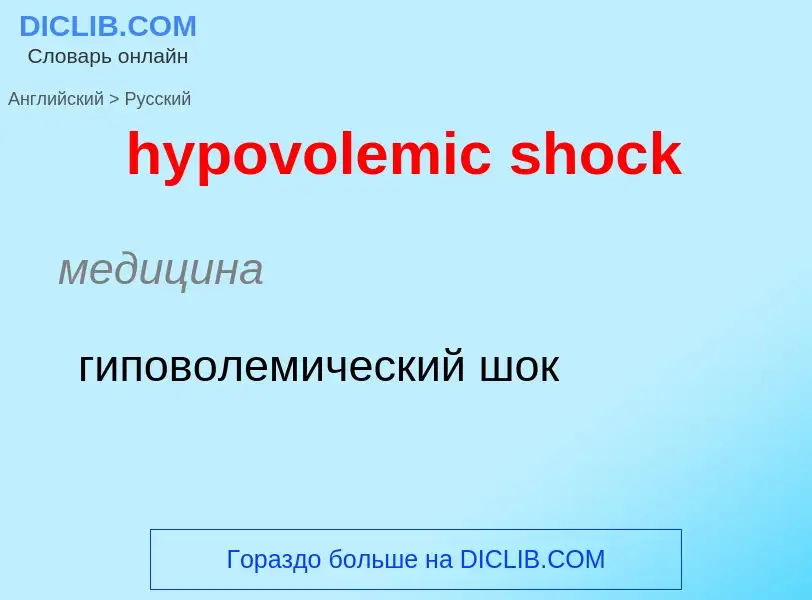Traducción y análisis de palabras por inteligencia artificial
En esta página puede obtener un análisis detallado de una palabra o frase, producido utilizando la mejor tecnología de inteligencia artificial hasta la fecha:
- cómo se usa la palabra
- frecuencia de uso
- se utiliza con más frecuencia en el habla oral o escrita
- opciones de traducción
- ejemplos de uso (varias frases con traducción)
- etimología
hypovolemic shock - traducción al ruso
медицина
гиповолемический шок
медицина
геморрагический шок
медицина
циркуляторный коллапс
сосудистая недостаточность
Wikipedia
Hypovolemic shock is a form of shock caused by severe hypovolemia (insufficient blood volume or extracellular fluid in the body). It could be the result of severe dehydration through a variety of mechanisms or blood loss. Hypovolemic shock is a medical emergency; if left untreated, the insufficient blood flow can cause damage to organs, leading to multiple organ failure.
In treating hypovolemic shock, it is important to determine the cause of the underlying hypovolemia, which may be the result of bleeding or other fluid losses. To minimize ischemic damage to tissues, treatment involves quickly replacing lost blood or fluids, with consideration of both rate and the type of fluids used.
Tachycardia, a fast heart rate, is typically the first abnormal vital sign. When resulting from blood loss, trauma is the most common root cause, but severe blood loss can also happen in various body systems without clear traumatic injury. The body in hypovolemic shock prioritizes getting oxygen to the brain and heart, which reduces blood flow to nonvital organs and extremities, causing them to grow cold, look mottled, and exhibit delayed capillary refill. The lack of adequate oxygen delivery ultimately leads to a worsening increase in the acidity of the blood (acidosis). The "lethal triad" of ways trauma can lead to death is acidosis, hypothermia, and coagulopathy. It is possible for trauma to cause clotting problems even without resuscitation efforts.
Damage control resuscitation is based on three principles:
- permissive hypotension: tries to balance temporary suboptimal perfusion to organs with conditions for halting blood loss by setting a goal of 90 mmHg systolic blood pressure
- hemostatic resuscitation: restoring blood volume in ways (with whole blood or equivalent) that interfere minimally with the natural process of stopping bleeding.
- damage control surgery.

 trainees work with Naval Station Guantanamo Bay firemen to.jpg?width=200)

